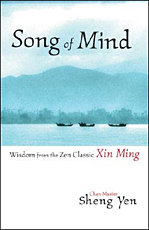Master Sheng Yen is the best-known Chan (Chinese Zen) master in America, having taught in the U.S. for more than 20 years. His Dharma Drum Buddhist Association has 21 centers throughout North America, as well as dozens of others throughout the world. He has co-led retreats with the Dalai Lama and is the author of other numerous books.
This edifying paperback is structured in the form of a week-long retreat. Master Sheng Yen examines the multiple meanings of the seventh-century Chinese Zen classic Xin Ming, or "Song of Mind." This poem offers much food for thought on meditation and the challenges faced by those who do regular spiritual practice. We were especially impressed with material on attachment (including to the goal of enlightenment), liberation, comparisons, distractions, attention, and much more. One of our favorite passages by Master Sheng Yen, which ably illustrates his clear writing, is about the vexation caused by making comparisons:
"Splitting hairs means making comparisons and distinctions, like comparing yourself with others, your present with your past or an imagined future, the good with the bad. Making such distinctions, you stray from the right path. People usually split hairs over minor things, but making distinctions of any kind is obstructive. A single thought that you can't let go of is also an obstruction. Whatever your mind dwells on is subject to change, while a true principle does not.
"Progress in practice is not steady and linear; it is more like a wave, sometimes going up, sometimes going down. A good day can be followed by a bad day, and vice versa. It can even change from sitting to sitting, from moment to moment. If you always perceive things as getting worse and worse, you have a mind of comparison. You will be making trouble for yourself, and may become disillusioned; you may lose faith in yourself, in the practice, and in the Dharma. When it comes to practice, making comparisons and distinctions only leads to problems."
